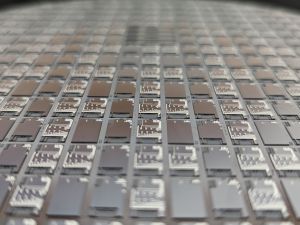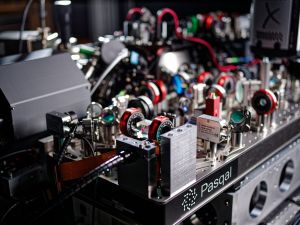The inaugural hackathon’s on sustainability solutions using quantum computing awards €50,000 to projects focused on renewable energy forecasting, data-driven applications, and molecular docking
Paris, November 30, 2023 – In the year marking the 400th birth anniversary of Blaise Pascal, the renowned French mathematician, philosopher, physicist and philanthropic entrepreneur, PASQAL initiated a competitive hackathon two months ago to underscore the benefits of quantum computing for sustainable development. On November 28, at an award ceremony in Pascal’s hometown, Clermont-Ferrand, PASQAL, Blaise Pascal Advisors and partnering organizations announced three winning projects and awarded €50,000 in prizes to continue their work.
The three winning projects are:
- First Place – “Neutral Atom Renewable Energy Forecasting: Improving Renewable Energy Forecasting with Neutral Atom Reservoir Computing” by Naomi Mona Chmielewski, Leo Monbroussou and Ulysse Remond [1]
- Second Place – “NeutroGen: Unlocking data driven applications: Optimally embedding neutral atoms for any data-driven application” by Maria Demidik, Cenk Tuysuk, Manuel Rudlph, Giorgio Fecellli,and Ravi Kumar [2]
- Third Place – “Molecular Docking with Neutral Atoms: Enhancing drug discovery pipelines to find a sustainable alternative to Paclitaxel” by Victor Onofre, Noe Bosc-Haddad and Mathieu Garrigues. [3]
“The tests that we did during this hackathon show that our model easily outperforms classical counterparts using fewer data and, as a result, less energy in renewable energy forecasting,” said 1rst prize winner Chmielewski, representing French energy company EDF with teammate Remond, and joining fellow PhD student Monbroussou of Naval Group. “With the support and advice of the hackathon’s mentors, we were able to discuss ideas of how to use our quantum design for an industrial use case implementation and how to use neutral atom quantum computers.”
PASQAL, in collaboration with Blaise Pascal Advisors, Michelin, GENCI, and Capgemini, launched the Blaise Pascal [re]Generative Quantum Challenge as a call to action for innovators around the globe to demonstrate the tangible impact of quantum computing. The initiative included an international hackathon and a groundbreaking study to rigorously assess the sustainability benefits of quantum computing through life-cycle analysis. The event included an award ceremony and an expert roundtable on sustainability, AI, and quantum computing.
“We congratulate the winners of this inaugural event for their thoughtful and promising ideas,” said Georges-Olivier Reymond, CEO of PASQAL. “We were extremely impressed with the response to this challenge and the breadth and depth of the entries and appreciate everyone’s participation. This event demonstrated the excitement that quantum technology can inspire in people to tackle the world’s biggest challenges.”
The hackathon lasted over 50 days and attracted more than 800 candidates with 75 proposals from 25+ countries. Participants worked alongside physicists and scientists from PASQAL, with consultants from Capgemini offering guidance and strategies along the way.
The jury panel that selected the top three projects included:
- Florent Menegaux, CEO of Michelin
- Frederic Magniez, Director of Research at CNRS
- Etienne de Rocquigny, CEO and Founder of Blaise Pascal Advisors
- Kristel Michielsen, Supercomputing Centre Jülich and Founder of EMBD
- Georges-Olivier Reymond, CEO of PASQAL
“As CEO of Michelin and a proud jury member of the Blaise Pascal [re]Generative Quantum Challenge, I am deeply committed to steering our company and community towards a sustainable future,” said Florent Menegaux. “We firmly believe that the path towards sustainability will take leveraging deep tech innovations to create positive social and environmental impacts. “
Following the presentation of the hackathon results, PASQAL is present at COP28 in Dubai, reaffirming its commitment to the race to net-zero carbon. On December 5th, PASQAL will unveil an innovative white paper on the benefits of quantum technology in sustainable development. PASQAL’s delegation will participate in COP28 to provide perspectives on emerging technologies that will power the energy transition.
PASQAL and its partners advocate for a science-based approach to sustainability in quantum computing, emphasizing the need for accountable life-cycle assessments beyond mere power consumption comparisons between classical CPUs and quantum processing units (QPUs). They aim to consider the complete environmental impact, from machine fabrication to end-of-life, in the total computation cycle, including potential hybrid architectures combining CPUs, GPUs, and QPUs.
“How could the fascinating quantum odyssey come with a meaningful purpose? We were impressed by the worldwide creativity unleashed by our sustainability-dedicated challenge. Though not yet completely mature, we were even more surprised by the quality of the proposals with truly sustainable use-case, astute engineering and convincing quantum ideas to reduce carbon emissions of computing in life-cycle analysis,” said Etienne de Rocquigny, Founder of Blaise Pascal Advisors.
More Information on Winning Projects
1st prize: Neutral Atom Renewable Energy Forecasting
While renewable energy sources present a great opportunity to overcome the current climate crisis supplying the people with energy from sustainable sources also presents its challenges. Unlike other energy sources that can be turned on and off as energy consumption changes, the management of renewable energy sources must be perfectly optimized to fit demands. Models that can predict the behavior of such complex systems can be hard to train and require a great amount of energy and data. An interesting machine learning paradigm to model physically complex systems like these is known as reservoir computing. A reservoir is it self a physical system that exhibits complex behavior. Its dynamics are used to replicate the behavior of underlying time series. The linear regression is the only training step, and is done after all data has been fed successively through the reservoir, therefore has a very low training cost. A free arrangement of neutral atoms makes reservoir computing particularly well suited for analog frameworks such as PASQAL’s machines.
2nd prize: NeutroGen
Optimizing the layout of a wind farm such that it is maximally efficient quickly becomes a complex problem characterized by varying wind velocities across the field and the need to prevent windmills from obstructing one another when positioned closely. Neutral atom quantum computing provides a promising framework for addressing a wide variety of data-driven sampling problems that can be adapted to combinatorial optimization that can leverage any previously-found solutions from a conventional optimizer.. Incoming data can be automatically translated to high-quality neutral atom positions via techniques from spectral graph theory. The resulting atom embedding gives rise to generated data with similar correlation patterns as the original data using current-day adiabatic protocols.
3rd prize: Molecular Docking with neutral atoms
Identifying new potential molecules for medical treatment isa computationally intense and oftentimes infeasible task. New strategies are emerging to speed up the process, such as structure-based virtual screening, which relies on molecular docking to predict the activity of the candidate molecule at the binding site of the target protein. A molecular docking problem can be mapped into a graph problem via the binding interaction graph for which the (Weighted) Maximum Clique problem has to be solved for the ligand-receptor interactions.
About Blaise Pascal Advisors
Blaise Pascal Advisors is an advisory firm of entrepreneurs and executives to put tech at the service of strategy and meaning. It was founded by Etienne de Rocquigny, mathematician and entrepreneur, former Vice-Dean of Research at Centrale Paris, co-founder with Bpifrance of the data-AI program and a cutting-edge think-tank in algorithmic ethics. Blaise Pascal Advisors has accompanied more than forty algorithmic and pivotal entrepreneurial adventures with impact. Learn more: www.blaisepascal-advisors.com
About PASQAL
PASQAL is a pioneering company in quantum computing. It was founded in 2019, by Georges-Olivier Reymond with Alain Aspect, 2022 Nobel Prize in Physics; Christophe Jurczak; Antoine Browaeys and Thierry Lahaye. PASQALis the European leader in quantum technology and aims to rise to the rank of world leader, notably by developing a 1,000 qubit quantum computer in the short term. PASQAL has obtained more than 140 million euros in financing and relies on a team of more than 170 employees. The company has 25 clients around the world including Thales, Airbus, EDF, RTE, BMW, Johnson & Johnson and Siemens.


